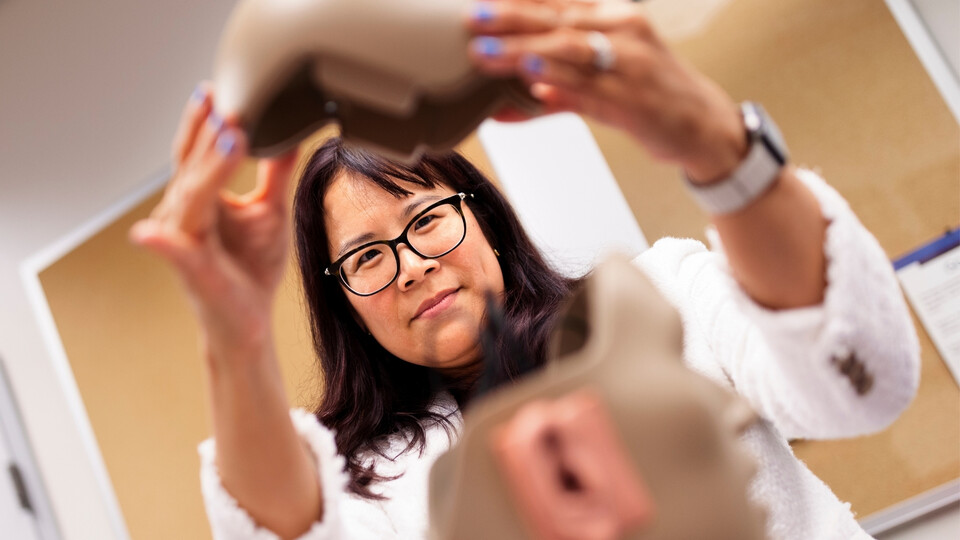Kateri Hartman, August 27, 2021
Wang shifts gears, takes helm of Durham School
This summer, Lily Wang enjoyed pineapple, piña coladas — and a career shift as she became the director of Durham School of Architectural Engineering and Construction on July 1.
The tropical refreshments came while she vacationed in Hawaii with her family at the end of a six-month faculty leave she took to rediscover her love for research. Upon her return, Wang left a previous leadership position in the College of Engineering’s dean’s office to assume the Durham directorship.
Among the reasons Wang sought her new role are the unique opportunities the Durham School offers as the only endowed school within the Nebraska College of Engineering and its dynamic relationship with industry.
“We have an amazing industry here in the state of Nebraska around architectural engineering and construction,” she said. “It’s impressive the number of hours and industry experience our professional partners bring, working with our students and sharing up-and-coming things that they see while designing and constructing buildings.”
Twice, the National Council of Engineering Examiners and Surveyors has awarded the architectural engineering program within the Durham School a $25,000 prize for its student experiences. The program has also placed second for the award several times, most recently in 2021.
Director of the Durham School is Wang’s ninth academic appointment since she joined the Nebraska faculty as an assistant professor in architectural engineering in 2000. A nationally recognized expert in acoustics, her field of research, Wang also has become one of the most senior female leaders in the College of Engineering, where she was appointed associate dean for faculty and inclusion in 2018.
“I feel very fortunate, I’ve always felt supported here,” she said. “UNL has done a wonderful job at making sure that my career has been supported the whole time. I’ve always felt that my concerns were considered and my research interests are valued.”
Wang said she feels drawn to leadership, and hopes she can use that trait to benefit the Durham School.
“The school has come a long way since it was founded over a decade ago,” she said. “We’ve made a lot of progress, but I feel there are three areas that I’m very interested in continuing.”
The three goals Wang has moving forward are:
– Tell the Durham School’s story in a better way and communicate the great things that are happening both with students and faculty nationally and internationally.
– Continue leading industries, particularly developing innovative technologies with smart buildings, building materials, and building operations.
– Improve diversity and inclusion, especially representation within the construction programs; change and lead initiatives to help diversify the field and build more inclusive work environments
Wang’s goal to improve diversity and inclusion progresses naturally from her work as associate dean.
“I started doing a lot of learning about how other people experience engineering and their sense of belonging and inclusion, and I started realizing that, yeah, there is a reason why all of a sudden, I am one of the most senior women in the college,” Wang said.
As associate dean, Wang led the effort for the College of Engineering to become a partner in the American Society of Engineering Education Diversity Program. The College of Engineering earned a bronze-level recognition status within the program in 2019.
As director of the Durham School, Wang pledged to continue her efforts to connect, mentor and continue recruiting faculty, staff and students in underrepresented populations.
When she flew to Nebraska from Denmark for a job interview in 1999, Wang didn’t know she was launching a 21-year career. Then a postdoctoral fellow at the Technical University of Denmark, she didn’t even know where Nebraska was on the map.
After accepting the faculty position, she envisioned herself following her longstanding dream to design a concert hall. Her lifelong passion for music and interest in concert hall acoustics are what propelled her to consider a career in acoustical engineering as a high school student.
“I still have yet to design a concert hall,” Wang said. “But I found a better position, which was to be a professor and teach about how sound behaves in buildings.”
Working with sound in buildings such as schools, offices and hospitals became more important to Wang.
“We can impact a lot more people and their experiences in buildings if we look at these more common uses,” she said.
In one leading area of her research, Wang studied the acoustic and environmental conditions in K-12 classrooms to improve learning environments.
Wang received her doctorate in acoustics from Pennsylvania State University and a bachelor of science in engineering with a certificate in architecture from Princeton University. After serving as a postdoctoral fellow in Denmark, Wang came to Nebraska, where she’s been director of the Durham School for just under two months.
“Even if it is a very difficult job, I’m ready and prepared for it,” she said. “It’s also a very rewarding one. You can have a lot of positive impact in this position.”
College of Engineering Durham School of Architectural Engineering and Construction






